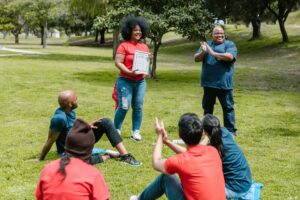Writing a personal narrative is a great way for English language learners to practice creative writing. A personal narrative relates to ones personal experiences. It is told in first person, usually. Often, its content is non traditional. To help us write about our own experiences or life, we can use a personal narrative prompt, such as…
- Write about the biggest surprise of your life.
- Describe the most memorable holiday in your family, including how you felt and why it was memorable.
- Choose one event that happened recently (today, yesterday, or earlier in the week). Use all five senses to describe the event in a vivid way.
- Write about a time when you felt afraid.
- Talk about a time you felt disappointed. Include what you expected from the situation and how reality did not live up to your expectations.
- What is your favorite place in the world? Use descriptive language to explain how it makes you feel.
- Have you overcome a major challenge in your life? What did it teach you?
- Write about a time when you thought a situation was worse than it really was.
- Describe a memory you have with an animal. Why was this moment special for you?
- Think about your favorite smell. What does it remind you of?
- Think about a terrible smell. What does it remind you of?

Stretch your writing: WWWWH
In order to extend your writing, try the WWWWH method. The acronym stands for: Who, What, Where, When, Why and How. Try to ask yourself these questions if you need to extend your personal narrative.
Why do we write personal narratives?
Personal narratives allow you to connect deeply with people. When you tell your own story, you are making yourself vulnerable and people respond to your authenticity.
The Structure of a Personal Narrative
This guide will aid you while writing your own personal narrative. This is a basic structure of a personal narrative that can be altered for your own needs.
#1: Mindmap: Generate ideas by brainstorming and writing inn your journal. Mindmapping is a simple and effective way to brainstorm. You can draw pictures and cut photos from magazines, too. Anything that helps you prompt your memories.
#2: Write an Outline: An outline will help you stick to a clear structure in your writing
#3: Write in First Person. The first person means you wll use “I” when writing your personal narrative.
#4: Add specific detail. Adding detail will make the story interesting and bring the story to life. Be sure to add exact details for the different characters in your story.
#5: Follow the time line. Normally, when writing a personal narrative, you should try to stick to telling the story in chronological order. Sometimes, if it suits the purpose of the story, it might make sense to deviate from chronological order, but there should be consistency and purpose to whatever you choose to do.
#6: Proofread! Make sure you revise and edit your personal narrative. Check for grammar and spelling mistakes, and give it to another person to read, too.


Brainstorm by doing some Reflective Writing Prompts
Reflective writing is another way we can write about our experiences. Reflective writing is usually something we write for ourselves; it is like writing in our journals. Reflective writing can put us in the mindset of writing a personal narrative if we feel “stuck”
- Describe a day from this week. Which day was the busiest? Did it feel that way?
- Record your emotional reactions for several days in a row. Do you see a pattern? What can you do to change an emotional pattern?
- Make a goal in the morning and reflect back on it at night. Write about whether you accomplished that goal, and if so, what helped you. If you didn’t accomplish your goal, reflect on what you could do differently next time.
- Write out a conversation you had as if it were dialogue in a story. Would you change any of your lines if you could do it again?
- Write about a moment of kindness. How did someone help you today? How did you help someone else?
- Reflect on your relationship with someone in your family. How do you get along with them? What would you change about your behavior? What could they change?
- List your goals and priorities for the week. Reflect on whether they reflect your personality or just your schedule.
- Describe your favorite things about yourself. What makes you unique? What makes you belong to a bigger group, such as your family, friends, or community?
For more resources, check out this San Jose State University Writing Center sheet.
Also, you might want to peruse these posts that share more resources and tips to get your ESL students writing their little hearts out.
Reading English Stories: Public Texts
Practice English: Creative Writing Prompts



















